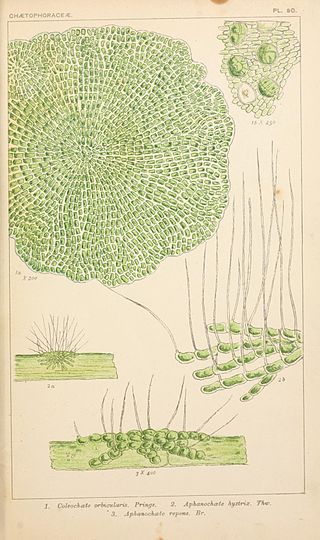
The Chlorophyceae are one of the classes of green algae, distinguished mainly on the basis of ultrastructural morphology. They are usually green due to the dominance of pigments chlorophyll a and chlorophyll b. The chloroplast may be discoid, plate-like, reticulate, cup-shaped, spiral- or ribbon-shaped in different species. Most of the members have one or more storage bodies called pyrenoids located in the chloroplast. Pyrenoids contain protein besides starch. Some green algae may store food in the form of oil droplets. They usually have a cell wall made up of an inner layer of cellulose and outer layer of pectose.

Charales is an order of freshwater green algae in the division Charophyta, class Charophyceae, commonly known as stoneworts. Depending on the treatment of the genus Nitellopsis, living (extant) species are placed into either one family (Characeae) or two. Further families are used for fossil members of the order. Linnaeus established the genus Chara in 1753.
Pseudochlorella signiensis is a species of green algae in the family Koliellaceae. Pabia signiensis, the only species in the genus Pabia, is regarded as a synonym. Pabia was sunk into Pseudochlorella in 2016.
Pleurastrum is a genus of green algae, specifically of the Chlorophyceae. As of February 2022, it was the only genus in the family Pleurastraceae.
Bracteacoccus helveticus is a species of green algae, in the family Bracteacoccaceae. Under its synonym Cryococcus helveticus, it was the only species in the genus Cryococcus.

Sykidion is a genus of green algae. Pseudoneochloris is a synonym of this genus. As of March 2022, Sykidion was the only genus in the family Sykidiacaeae, which was the only family in the order Sykidiales.

Chlorokybus is a multicellular (sarcinoid) genus of basal green algae or charophyte. It has been classified as the sole member of the family Chlorokybaceae, which is the sole member of the order Chlorokybales, in turn the sole member of the class Chlorokybophyceae. It grows on soil and rock surfaces, and is rare.

Coleochaetaceae is a family of algae. It is the only family in the Coleochaetales, an order of parenchymous charophyte algae, that includes some of the closest multicellular relatives of land plants. They questionably include the fossil genus Parka.

Klebsormidiales is an order of charophyte algae. It is the only order in the class Klebsormidiophyceae, sister of the Phragmoplastophyta. As of February 2022, AlgaeBase accepted two families in the order:
Trochiliscaceae is a family of fossil charophyte green algae. It is the only member of the order Trochiliscales. The reproductive structures in Trochiliscaceae have a calcified cover, called a utricle, that is thought to prevent the zygote being desiccated. Other Paleozoic families lack this cover, as do modern charophytes. Fossils of Trochiliscaceae are from the Devonian.

Feistiellaceae is a family of freshwater green algae in the order Charales.






